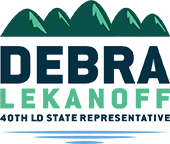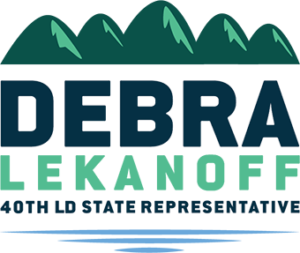Working for the Next Generation on Fantastic Friday!
Dear Friends,
In 2018, Beth was a monumental volunteer, one of the hundreds across Washington State who make a difference by helping get out the vote and supporting candidates to stay strong throughout a campaign season. Our elections and campaigns are built on the foundation of volunteers like Beth, and today I want to recognize her as someone who made a tremendous impact in the 40th and 42nd districts and is deeply respected in Whatcom County. In that 2018 campaign, thanks to the leadership of volunteers like Beth and many, many others, we knocked on 19,000 doors. Today, I want to express my heartfelt gratitude to Beth, a truly special person in my life. In 2018, her remarkable spirit and unwavering passion stood out. As a loving wife and dedicated mother, Beth reminded us all that our freedom to voice our opinions is realized through our vote. She emphasized that voting is not just a right, but a shared responsibility.
Beth firmly believes that doing the right thing is always the right choice. She champions the idea that every person’s life matters, regardless of their background, and urges us to remember that we are stronger together. This message resonates deeply in our community, reinforcing the necessity of unity and empathy during challenging times.
I will never forget the moment Beth bravely stood up and led many to elect a Native American candidate, a Lummi member whose roots run deep in the Salish Sea. Had he won the 42nd Senate Race, it would have marked a monumental moment as only the second elected official with Native bloodline roots in Washington State. This moment in Whatcom County is historic, and her advocacy highlighted her commitment to inclusivity and representation for all voices.
Today, I honor Beth not only for her courage but also for the profound impact she has had on my journey. Without her support and encouraging words, I believe I would not have won my own race in 2018. She embraced me, held me tight, and assured me that I could overcome any challenge—reminding me that it was my time to serve in the Washington State Legislature.
Beth, your unwavering belief in me and your daily commitment to our community inspire me immensely. Thank you for being a guiding light in my life. Together, we will continue to fight for the principles we hold dear, ensuring that every voice is heard and valued. Your strength and passion make a difference in the lives of many, and I am truly grateful to call you my friend today
Keep reading for more on this Fantastic Friday.
Rep. Debra Lekanoff
Securing Vital Funding for Whatcom Families
A Superior Court judge has rejected an initiative to repeal a tax funding essential child-care programs in Whatcom County, ensuring the tax remains on the November 5 ballot. Judge Lee Grochmal’s ruling is a significant victory for supporters of the Healthy Children’s Fund, which provides crucial support to families across the county.
During a 90-minute hearing, Judge Grochmal found that the initiative violated the contracts clause of the Washington Constitution, stating that financial matters cannot be modified or repealed through initiatives. He emphasized that allowing the repeal would severely impact the county’s budgetary authority.

“This is not an action that can be repealed by initiative,” Grochmal stated, granting an injunction requested by Protect Whatcom Kids, a coalition defending the Healthy Children’s Fund. The organization argued that the initiative, proposed by a Lynden business owner and others, was flawed due to procedural errors and misleading statements during signature gathering. Attorney Knoll Lowney identified four “fatal flaws” undermining the initiative.
The ruling highlights both the legal standing and community importance of the Healthy Children’s Fund. Established through Proposition 5, which passed by just 20 votes in 2022, the fund plays a vital role in supporting families throughout Whatcom County by expanding access to high-quality, affordable child care for all parents. This financial support helps ensure children receive necessary care while parents work or pursue education, significantly impacting families’ economic stability and well-being.
Proposition 5 imposes a tax of 16.75 cents per $1,000 of assessed property value, expected to generate about $10 million annually for child-care services, focusing on enhancing early childhood education quality and availability.

Learn more about the Healthy Children’s Fund here!
Judge Grochmal clarified that the child-care tax was established through a valid legal process and integrated into the county’s budget and service planning. “The child-care tax was not subject to repeal. For that reason, the initiative is invalid,” he noted.
Supporters of the Healthy Children’s Fund welcomed the ruling with optimism. Attorney Knoll Lowney expressed relief and satisfaction with the outcome, affirming the community’s commitment to supporting child-care initiatives benefiting families.
As Whatcom County progresses, officials are committed to implementing plans funded by Proposition 5. With support from the Healthy Children’s Fund, community programs will continue enhancing early childhood education and making quality child care accessible to all families in the area. This decision ensures continued critical funding for child-care services and reinforces the county’s commitment to its youngest residents’ welfare, emphasizing that investing in child care is an investment in the community’s future.
My strategy for 2025 Legislative Session is to explore opportunities for the STate and Local governments to partner together – Imagine a future where local governments have the Legislative policy and fiscal support and resources necessary to enhance their fiscal capacity to effectively partner in the areas of Early Learning and Child Health. If local governments were to adopt a fiscal model similar to Whatcom County’s—one in which we explore the State providing a match of 50% of funds through Washington State’s Capital Gains Tax Revenue specifically allocated for children’s services and education—we could significantly strengthen our investment in the well-being of our youngest residents.
The Capital Gains Tax, enacted by lawmakers in 2021 and upheld by the state Supreme Court in 2022, generated approximately $786 million in its first year of collections in 2023. As of May 15, 2024, collections totaled $433 million. Each year, up to $500 million from the tax is deposited into a state account dedicated to K-12 schools, colleges, early learning, and child care programs. Any additional funds beyond that threshold are directed toward school construction and renovations. The Education Legacy Trust Account, which supports K-12 education, expands access to higher education, and funds early learning and child care programs, is critically reliant on this revenue.
Opponents of Initiative 2109 argue that eliminating the Capital Gains Tax would exacerbate funding crises in child care and education and necessitate new taxes to offset the lost revenue. On the contrary, supporters assert that the state can generate sufficient revenue for education and child care without relying on the Capital Gains Tax, pointing to the tax’s volatility and susceptibility to economic fluctuations.
It’s essential to understand that maintaining the Capital Gains Tax is vital for sustaining a stable and reliable funding stream that enables the State to invest in early childhood education and health programs. By keeping this tax, we can explore supportive legislative tools Counties like Whatcom County, which exemplify how local governments can construct effective financial models aimed at fostering early learning and child health.
Furthermore, the fiscal impact statement from the Office of Financial Management estimates that passing Initiative 2109 would result in a loss of $2.2 billion for the Education Legacy Trust Account over the next five fiscal years, significantly undermining our educational infrastructure. While proponents of the initiative suggest it may provide fiscal relief by saving state agencies an estimated $10.1 million over five years, it is critical to weigh those potential savings against the long-term investments in education and child care that the Capital Gains Tax secures.
To bring our vision to life and protect these vital resources, we must forge ahead with further collaboration and stakeholder engagement as we prepare for the 2025 legislative session. Navigating the challenges posed by the upcoming election season will be essential to ensuring that this initiative gains the traction it needs.
I am honored to explore and advocate for these forward-thinking initiatives alongside esteemed colleagues in the state legislature, including Finance Chair April Berg, Early Childhood and Human Services Chair, Appropriations Chair Tim Ormsby, and Representative Alex Ramel. Together, we can make meaningful strides toward improving Early Learning and health outcomes for children across Washington State. By working collaboratively, we can ensure that every child has the opportunity for a bright and healthy future.
Solutions for Environmental Stewardship
As discussions around environmental stewardship evolve in Washington State, integrating sustainable practices within agriculture and various industries is increasingly important. By promoting initiatives like riparian buffer zones, we can protect natural resources while ensuring economic viability.
Riparian buffers – vegetated areas adjacent to water bodies – are essential for maintaining water quality, preventing erosion, and enhancing biodiversity. Recognizing their critical role, agricultural stakeholders can benefit from programs that support their transition to these practices.
Recent reports emphasize the need for collaboration between agricultural producers and conservationists. Solutions-oriented approaches, such as investing in riparian zones, can create healthier ecosystems while enhancing agricultural productivity.
Various grant programs assist private landowners, including farmers and those in forestry, to implement best management practices that align with both economic and ecological goals. These taxpayer-funded programs support the transition toward more sustainable practices while acknowledging contributions from different sectors.
-
Environmental Quality Incentives Program (EQIP): This USDA initiative offers financial and technical assistance to landowners implementing conservation practices, including riparian buffers, improving water quality while maintaining productivity.
-
Salmon Recovery Funding Board (SRFB): This program allocates funds to projects restoring salmon habitats, emphasizing collaboration with private landowners to enhance ecological health and benefit local economies.
-
Washington State Conservation Commission Grants: These grants provide financial assistance to farmers and private landowners for implementing best management practices, encouraging compliance with environmental regulations and fostering community engagement.
-
Regional Fisheries Enhancement Groups (RFEGs): RFEGs work with landowners to enhance fish habitats, demonstrating successful partnerships that benefit both agriculture and environmental conservation.
In addition to agricultural practices, the Washington State Forest and Fish Law emphasizes sustainable forestry through mandatory riparian buffers and protective measures for aquatic ecosystems. This law has led to improved salmon populations and greater collaboration among forestry stakeholders.
By investing in sustainable forestry practices, landowners can benefit from healthy forest ecosystems. Programs supporting compliance with the Forest and Fish Law create opportunities for forest managers to align economic interests with environmental stewardship.
The oil and gas industry also contributes to restoration efforts through fees dedicated to mitigating ecological damage caused by historical practices. By collaborating with state agencies and conservation organizations, the industry can turn liabilities into opportunities for restoration, fostering a culture of accountability and sustainability.
Looking ahead, the collective efforts of farmers, foresters, and the oil and gas industry present an opportunity to create a sustainable model for managing environmental resources. I am committed to finding solutions that do not burden future generations of Washingtonians. Together, we can promote cooperation and investment in habitat creation while preserving our natural heritage and supporting local economies.
Ongoing investment in education and technical resources for landowners is vital. Participating in programs that facilitate sustainable practices can mitigate environmental impacts, leading to healthier ecosystems and improved economic outcomes. While I remain neutral on the decision regarding riparian buffers, I am dedicated to finding a solution.
This cooperative approach ensures shared responsibility for environmental stewardship, encouraging all parties to contribute positively to Washington’s natural resources. Embracing a collaborative framework that values ecological integrity alongside economic vitality will be crucial for long-term success as we navigate resource management complexities.
Supporting Our 40th LD Representatives
As your elected official, I want to provide an update on the upcoming election for the 40th District state representatives.
While Representative Ramel and I are running unopposed, the Guemes Island Ferry Workers, a bargaining unit of the Inlandboatmen’s Union of the Pacific, has endorsed our reelection.They have also endorsed Liz Lovelett for reelection to the state Senate.

State Rep. Debra Lekanoff visits with Purser/Deckhands James Haugen and Evan Noteboom during Guemes Island Ferry Workers’ Day of Action on May 1, 2023. Ferry workers were successful in their long campaign to win a fair contract and livable wage.
Representative Ramel and I have demonstrated our commitment to our state through bipartisan legislation. Our efforts have focused on:
-
Protecting access to health care
-
Improving behavioral health crisis response and treatment access
-
Safeguarding worker pay and rights
-
Promoting clean energy development
-
Easing the tax burden on disabled veterans and active-duty military personnel
-
Ensuring students have access to necessary nutrition
-
Fostering collaboration with tribal nations
-
Enhancing and protecting our environment
I encourage you to review our legislative records here.
You can search for “Lekanoff” or “Ramel” under “Session Law” in the Bills and Other Biennium Documents section.
While we are running unopposed, your vote on November 5 is still important. It’s an opportunity to show your support for our continued efforts to improve the quality of life in Washington state.
Washington State has made significant strides in education funding since the 2012 McCleary decision, which exposed chronic underfunding in our K-12 system. Over the past 12 years, we’ve increased per-student funding by 89%, from $9,600 in 2013 to over $18,000 today. Our teachers are now the fourth highest-paid in the nation, averaging $86,804 annually.
We’ve invested in full-day kindergarten, enhanced special education funding, supported small rural schools, and established programs for low-income students and those needing learning assistance. However, as we approach the 2024-2025 school year, many districts face budget cuts due to declining enrollment and insufficient state funding.
Districts are employing innovative strategies to manage shortfalls. For example, Meridian School District implemented administrative furloughs to address a $2 million deficit without significant layoffs. Five districts are under binding agreements with the state due to unsustainable financial practices.

The OSPI is working dilligently to support schools across our great state!
Enrollment trends significantly impact this crisis. OSPI projects a 7% decrease in statewide enrollment by 2030. As federal relief funding ends, schools face a precarious situation. OSPI plans to request $1 billion from the Legislature to help close a $1,000-per-student funding gap and provide additional resources for special education and maintenance.
In our 40th and 42nd districts, we see varying trends. While Blaine and Mount Baker face enrollment declines, Ferndale, Lynden, Meridian, and Nooksack Valley are experiencing slight increases, reflecting broader demographic shifts.
Moving forward, we must re-evaluate fiscal management and maintain transparent communication with our communities. As your representative, I’m committed to upholding our constitutional responsibility to provide quality education for every student. We’ll continue working on proactive measures and strategic planning to address financial disparities and ensure all students have the resources they need to thrive.
$1.5 Million in Funding for San Juan Ferries
As your elected official, I’m pleased to share important news regarding ferry service improvements for San Juan County. Governor Jay Inslee has allocated $1.5 million to address service disruptions affecting our islands.

The San Juan Islands rely on our ferries, and I am proud to support their work!
This funding includes $1 million for temporary transportation solutions and $500,000 to enhance weekend interisland services during winter months.
The funding will support three key initiatives:
-
A passenger-only water taxi service
-
A charter service between Anacortes and the San Juan Islands
-
An on-call barge transportation service for essential deliveries
Our 40th Legislative Team is working to secure long-term funding for the inter island taxi ferry system while addressing job creation and housing options. We’re collaborating with Senator Lovelett and the Ferry Caucus to advocate for fair wages, and partnering with the local Opal Housing program to improve transportation accessibility.
I am working with Anacortes Port Commissioner Bonnie Bowers to enhance the port’s barge landing area, aiming to increase goods transportation capacity and reduce reliance on WSDOT ferries.
To ensure effective use of these funds, San Juan County plans to form a Transportation Working Group and prepare a legislative request to further address ferry service impacts

Thank you, Governor Inslee!
Governor Inslee acknowledged that while this funding won’t resolve all issues, it promises significant improvements. The funding will increase interisland connectivity and help maintain a stable workforce by encouraging year-round residency for crew members.
We’re committed to enhancing our transportation infrastructure and will continue to keep you updated on our progress. As always, we welcome your input and support as we work to improve ferry services for our community.



